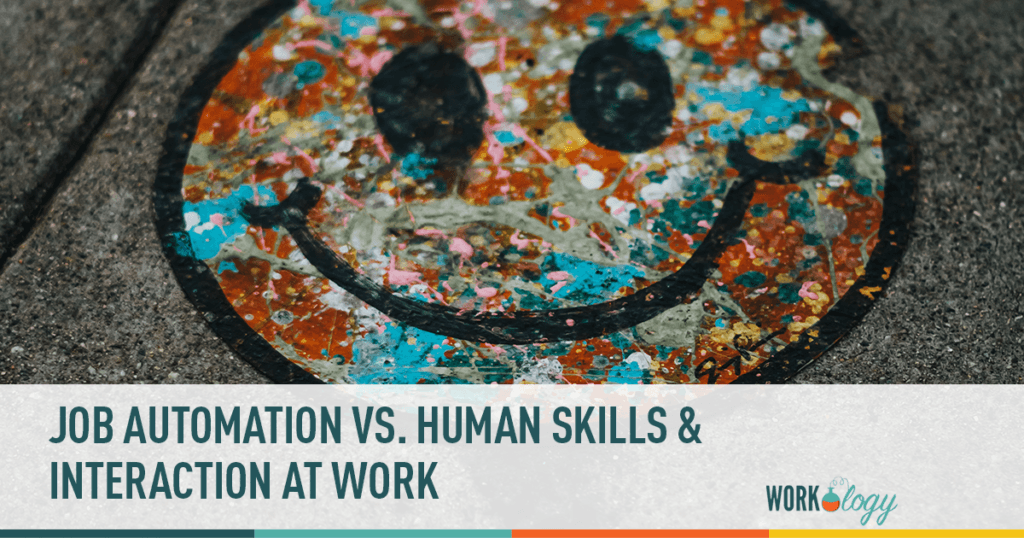As robotics and artificial intelligence (AI) continue to advance in the coming decade the prospect of job automation will increase significantly. This will mean many jobs lost. Yet it will provide us an opportunity to create jobs as well. The prime consideration in this job creation will be that these jobs need to be ones that cannot be supplanted by robots or AI. This post will explore why it will be important for jobs to be more “human.”
Job Automation and AI is taking over many jobs
Industrial robots have become a common fixture in many workplaces where assembly required, or strength and speed. One of my favorite shows of TV, How It’s Made, features them all the time. But today and in the future many jobs that we have considered safe, the “knowledge jobs”, will be taken over by AI. Jobs in the legal profession, medicine, advertising, writing, editing, computer programming and even HR can already be performed by AI in some aspect. Futurist, writer and director of the EraNova Institute Richard W. Samson, said in a recent article “As higher-level know-how is incorporated into electronic systems every profession will feel the impact- even thought-intensive ones…” Samson went on to further say that there will continue to be work in knowledge-intensive occupations for two kinds of professionals: 1) Those who create the AI and robots to replace other jobs and 2) those who have “highly human skills.” As he calls them these are “nonprogrammable” skills.
Human skills
Samson notes that in many jobs today we select people for technical capabilities and skills. These are the kinds of things that can be replaced by job automation. He says:
“Today, highly human skills– such as perceptiveness, creativity, responsibility, and social acumen- are often greatly prized in the workplace, but too often considered ‘nice-to-have” supplements to the hard, process-oriented skills outlined in the job description. While many astute recruiters and hiring managers do look for highly human qualities in addition to specialized knowledge and experience, it needs to happen much more often.”
Samson has a list of seven “human skills” that he thinks will be hard for job automation AI and robots to duplicate. These include:
- Conscious monitoring and control– Mostly to intercede to prevent mishaps
- Hypothesizing– Looking for an explanation to a problem, for a state of affairs or for a condition of nature.
- Creativity and imagination – AI doesn’t yet do “fantasizing”.
- Subjective Decision Making – I am reminded of the movie I Robot , where the reason Detective Spooner hates robots is that he was saved by one because he was the “logical” choice to save as opposed to the 12 year old girl.
- Social skills – To Samson this includes leadership, responding to leadership, motivating others, listening, speaking, reading body language, organizing, conveying a vision and inspiring enthusiasm. I think some of things can potentially be automated but they still require human interaction.
- Responsibility – This is the “crowning realization of integrated, well-functioning self-consciousness.” It incorporates ethics.
What can you do?
In HR we sit in a position of being job creators, at least potentially. So what do you need to do to insure that two years from now, or five years that your organization will still be prospering and employing people?
First, start doing a current review of all your jobs and start thinking in terms of what non-human tasks could be moved to technology. Think a head, the technology may not exist now to replace some job aspects but it might. To an extent we are doing that right now. HR software allows employees and managers to interact with HR processes without ever interacting with an HR representative. We have long known it is not necessary to have a person hand out a form. Those are readily available on a computer and once completed can be electronically stored without HR involvement. Look at all your jobs and determine what is essentially non-human about it?
Secondly, start identifying all the “essentially human” aspects of each job. What has to be decided that requires subjective reasoning rather than objective reasoning? What requires imagination and creativity? What requires consideration of alternative hypothesis? What requires an exercise of responsibility and ethics? Start thinking in job design terms that incorporate these human elements.
In HR we already exercise this “humanness” in some situations. A computer would look at the number of absences, even possibly some of the reasons for the absences, to make some determination on whether someone should be issued a warning or termination for excessive absence from work. It would handle all situations the same. But we know that not all situations are the same and that is where the exercise of subjective decision-making comes into play.
The Future
How quickly you need to do this depends on how quickly technology is replacing work in your industry. That is something you need to understand in order to start taking a look at the nature of the jobs that are being affected. Start working on those jobs to determine what is robotic and what is human and start re-writing those job descriptions.









